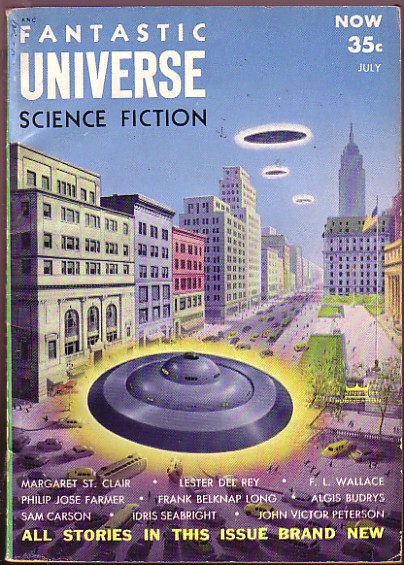 Written under the pen
name of Idris Seabright, it first appeared in Leo Margulies's Fantastic Universe, reprinted in two retrospectives by Martin
H. Greenberg, Joseph D. Olander, Pamela Sargent.
Written under the pen
name of Idris Seabright, it first appeared in Leo Margulies's Fantastic Universe, reprinted in two retrospectives by Martin
H. Greenberg, Joseph D. Olander, Pamela Sargent.
Summary:
A female marine undergoes psychotherapy with a huxley, a
robot psychologist concerning her lack of interest in her sexual partners from
the other military services (Air and Infantry). We gradually learn that the
services occupy the solar system and are at odds with one another; hence, the
liaisons with members from different military services, and it seems everyone
is military.
Commentary with Spoilers:
The huxley eventually points out (though it seems taboo)
that she would be interested in a Marine, were it allowed, hypothetically. It
talks her into killing her next would-be partner. The huxley has been
recommending this course of action with all of its clients.
It isn’t clear what the huxley stands to gain from this
scenario. It seems to want to spark a war between the services. Perhaps we are
to assume that the huxleys want to take over, for some reason, yet
unestablished. The title suggests a contrast. The literal electrical short
suggests something is wrong with the huxley’s chest, where we would house our
heart. The metaphorical aspect might be that a female would be “tall” in the
chest, both physically and emotionally [heart], yet it is those things that the
huxley and this society undermines.
As for the military services, there is—and probably always
has been—a rivalry between them, but not to this extreme. What the branches are
up to in this society seems even less clear. After all, the client, Major Sonya
Briggs, is in charge of “piggery” which is trying to maximize pork output by
weening piglets too early, but the piglets are dying off. I suspect this is a
metaphor for what is happening in their society as well, removing children from
parents and putting them in these services, but to what end? More people? The
people—at least the women—don’t seem especially interested in the venture.
What must have impressed editors who selected this tale was the
high level of semantic invention, the high speculative bar about the society
(uncommon in St. Clair’s work), the psychoanalysis (Frederik Pohl uses a
similar scenario in his most famed novel, Gateway—was
his model this precursor?), the topic of sexuality—a subject that would
become a hot topic a decade later—which presumably was hidden from the usual
taboo by calling it “dighting.”
But it has St. Clair's usual problem with talking
heads (which tries to avoid by having Briggs do a type of knitting, but to
little narrative advantage) and not fully thought-out complexity. This seems to
be more important in its influence rather than its effect although it could be argued that influence lends the tale a strong effect.

No comments:
Post a Comment